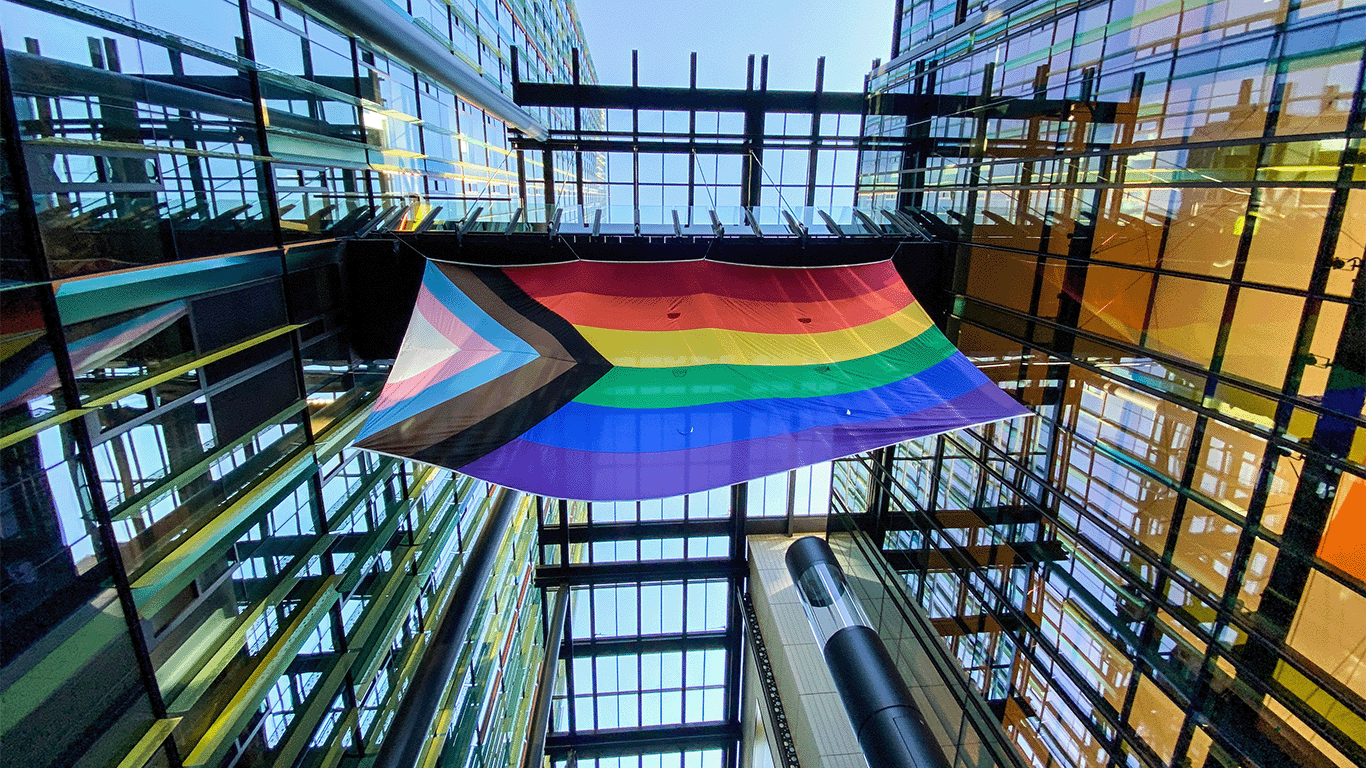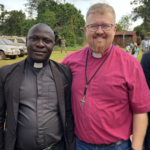
Raising Christian Teens in a Rainbow World
“One in six Generation Z adults say they’re bisexual.”
Source Gallup.
NOW THAT PRIDE MONTH IS OVER. I wanted to give some perspective on the challenge so many young Christians face when asked what they believe about LGBTQ+ people.
If Pride Month is an indicator of where our culture is, then it’s safe to say we live in a rainbow-colored world.

Who am I?
For the past ten years, I’ve studied, written, and been actively involved in ministering to LGBTQ+ people and families, not a lot, but enough to know how difficult and painful this area can be for everyone involved.
I pastor a small Anglican church in a community just north of Orlando and spend most of my time trying to raise kids, love my family, teach school, and pastor my congregation.
My experience comes from my doctoral research in this field, the work published in my podcast, and writings on Grace Nation and the hurting families to whom I’ve had the privilege to be invited into the most intimate parts of their lives.
I used to be far more active on social media, but around 2021, I felt the need to withdraw from actively writing and speaking in this area, opting to become monastic for a season.
If you are unfamiliar with what I mean, monastic refers to that peculiar group of Christians who intentionally withdrew from Christian communities. When Constantine converted and legalized Christianity, they observed developing corruption, apathy, and nominalism among Christians that came with no longer facing persecution for their beliefs.
Of course, as a husband, father, pastor, school teacher, etc., it’s pretty hard to remove myself from everyday responsibilities. But several events contributed to my need to retreat and reflect on everything happening.
There were reasons for it. So let me set the stage.
Three Years of Crisis
In 2019, I was involved in a painful separation from a denomination where I served. That had more of an effect on me than I anticipated.
While many issues surrounded that difficult choice, the problem of ministering to LGBTQ+ people lay just beneath the surface. I was troubled by the tone and posture of my leaders. And while I would have stayed, other issues forced my hand. My departure left me wondering in a wilderness where I had to reconcile two seemingly opposing points: being orthodox yet missional and traditional yet compassionate.
When the pandemic broke out, I noticed a “hardening of hearts” among many Christians on social issues, particularly Gen Xrs and Baby Boomers.
The 2020 political arena certainly contributed to an environment of hostilities. But it would be wrong to point to politics as the sole cause. Somewhere along the course of time, Americans had lost the ability to engage in healthy discussions on social issues, particularly on points of disagreement, without turning into anger or outrage.
It seemed to me that the heart of the matter was a fundamental breakdown in trust in anyone and everyone that didn’t agree with whatever the political right or left was putting forward as correct. Groupthink dominated dialogue and resulted in polarizing people on either political side.
I was not immune from this social virus and sometimes wavered. But I was surprised when I was attacked by so-called friends when I expressed my pastoral concerns on social media about how the President responded to certain public events, which is my role and responsibility as a Christian minister. This inability of Christians, particularly evangelicals, to distance themselves from partisan politics caused me to withdraw and ask, “Where is Christ in all of these conversations?”
In a private conversation thread, I raised this point and received “He ain’t Jesus” as the response. Yes, that’s true. But Christ Jesus clarified where our loyalties rest (Matt. 22:36-40) and how our behavior, regardless of our partisan politics, must be governed.
Even more grievous, I noticed an amalgamation of social issues that blended sexuality, gender identity, reproduction rights, racial reconciliation, etc., all under the banner of “wokeness” or “critical race theory.” As a result, speaking about these issues unconventionally or from a biblical point of view often resulted in being identified as “woke” or a “hater.” That is simply wrong-headed. Liberation is a central theme of Christian doctrine. And any doctrine that does not contain the theme of liberation is not Christian doctrine. Depending on the issue, a Christian can seem either Liberal or Conservative. That doesn’t mean we’re moderate. It means we’re Christian.
As a result of all this and more, I chose to withdraw for a season to discern how the Spirit was working in this social dilemma. I stopped podcasting and writing because I had some soul-searching to do. I’ve never changed my theological position. And I still hold an old fashion view that sex is limited to the marriage bed of one man and one woman.
However, all this noise made me ask myself, “Was my central premise, creating safe spaces for LGBTQ+ people to question the Christian faith and work out their salvation, the right thing to do? Or should I adopt the posture of fundamentalism, which is to separate from this group? Should I take a tougher stance on this topic?”
These questions circulated in my mind as I quietly considered my understanding of the matter. In truth, LGBTQ+ people comprise a relatively small percentage of the U.S. Population. So why bother with it? After all, traditionally, the entire population hovered just over 2.5%. With such numbers, it would be easy to focus on the other 97% of the population.

Generation Z
However, something has happened culturally over the past few years, making this one of our time’s most pressing missiological issues. According to statistics from Gallup, 20% of Generation Z adults identify as LGBTQ+. That is a 688% increase from just 20 years ago.
Accounting for this significant jump is the bisexual category. In the past, bisexual people were not trusted by either gay or lesbian people. They were viewed as carrying social diseases and alienated by both sides. Now it’s not only acceptable but seems preferred by a rising generation. There is just one problem. If this stat accurately measures the population, traditional Christians have a severe public perception problem, not seen since the days of the 1st century. According to David Kinnaman of the Barna Group, non-Christians view Christianity as homophobic and hateful.
This all came home to roost when my daughter decided to attend our local public high school.
When she entered high school in her 9th-grade year, it was 2020, and she was fourteen years old. The COVID-19 pandemic was in full swing, and our society was collapsing.
As a Christian pastor, I knew she would have some challenges, but I was unprepared for the outright hostility our daughter faced when her peers discovered who she was.
She was a Christian.
That year was challenging, not just for her but for me as a dad. I knew things were bad in public school, but I had no idea how far our society had drifted from Christian moorings. Her peers were dismissive of her faith and downright hostile, calling Christians “haters” and “hypocrites.” I know my daughter well, and her desire to fit in, make friends, and enjoy high school is no different than anyone her age trying to adjust to a new school. But those desires come at a cost. And when the word “Christian” is synonymous with hate, overcoming that stigma was pretty difficult. I know she attempted to fit in and avoid that label. But having a dad as a pastor and priest didn’t help.
As we talked about being a Christian in this time and day, it became clear that many of the girls she was trying to befriend identified as bisexual or lesbian or allies (straight people who are open and affirming).
What was the problem? Was she actively evangelizing and sharing her faith? Not at all.
Was she engaging in debates, condemning her peers for their choices? Of course not.
Was she trying to invite her friends to our youth group? Are you kidding, Dad?
It wasn’t safe for her.
She learned the clever art of hiding her faith in the proverbial closet to survive. That’s ironic. But that’s where we are now. So many Christian kids are shoved into a closet and told to be silent, not just by fellow students but teachers and administrators. We eventually pulled her out of the school and placed her back in private school.
But the damage had been done, and that time led to great confusion and misunderstanding.
You can see where the issue rests. The message that Christians hate gays has been so wildly successful that Christian kids are forced into a Christian closet or suffer social ostracization or bullying.
The very thing Christians did to gay people in the ’70s, ’80s, and ’90s is now happening to our children.
What happened to my daughter resonated deeply with me. I had spent years working with Christian parents of gay kids who had suffered in silent closets, put in there out of fear of being discovered. I had seen the result of gay kids being found out and ostracized by the church, parents, or friends. I even wrote a doctoral dissertation that partly traced the development of gay communities as places of refuge in major metropolitan areas as a necessary reaction to the harm inflicted by well-meaning but misinformed Christians.
Sociologists referred to these communities as “Gay Ghettos,” where young gay men and women could go and be “safe.” They often weren’t, but that’s another topic for another day.
What struck me through my daughter’s experience was how these same social forces were now coming to bear on Christian kids in public schools.
Christianity Going Forward
What will be the effect on our children? How will we disciple Christian children in today’s world? And how will we evangelize and disciple a generation that opposes and believes Christianity is a religion of extremists or even terrorists? Will we see the development of Christian Ghettos as a consequence of an increasingly intolerant society?
I hope not. And I don’t think we’re at that point yet.
Even considering these questions was something unimaginable just ten years ago. But if the present trajectory continues, we may be heading toward a crisis within our society reminiscent of Nazi Germany.
As we move forward in the 21st Century, these questions are essential to consider as the church grapples with a post-Christian culture.
Indeed, orthodox Christians — those committed to traditional interpretations of sexuality in the Bible — must learn how to maintain their positions while evangelizing this world with the gospel. It’s not actually that difficult to do. But it is imperative to adopt the posture of a missionary who must overcome significant challenges and obstacles to share that good news. And any missionary will tell you that the mission will fail if you begin the mission work from an adversarial posture.
The gospel, the good news that declares Jesus is the saving King, benefits all people, not just Christians. Western society is a testament to the advances in scientific development, the cures for social ills, and more. It is the only hope of ever mending a hopelessly divided society. But if a position of vitriol or hatred shrouds that good news, then perhaps, like the Pharisees, we have searched the scriptures on this topic but missed the heart of Christ (John 5:39).
The church must learn how to change its posture without changing its doctrine when ministering to LGBTQ+ people. If we don’t, then we may witness the disappearance of authentic Christianity in a generation or two.
Note: My views are expressly my own and do not necessarily reflect the institutions where I serve.




